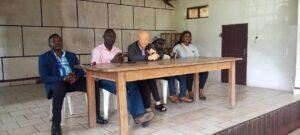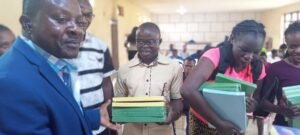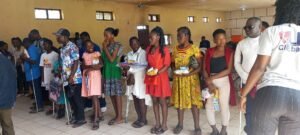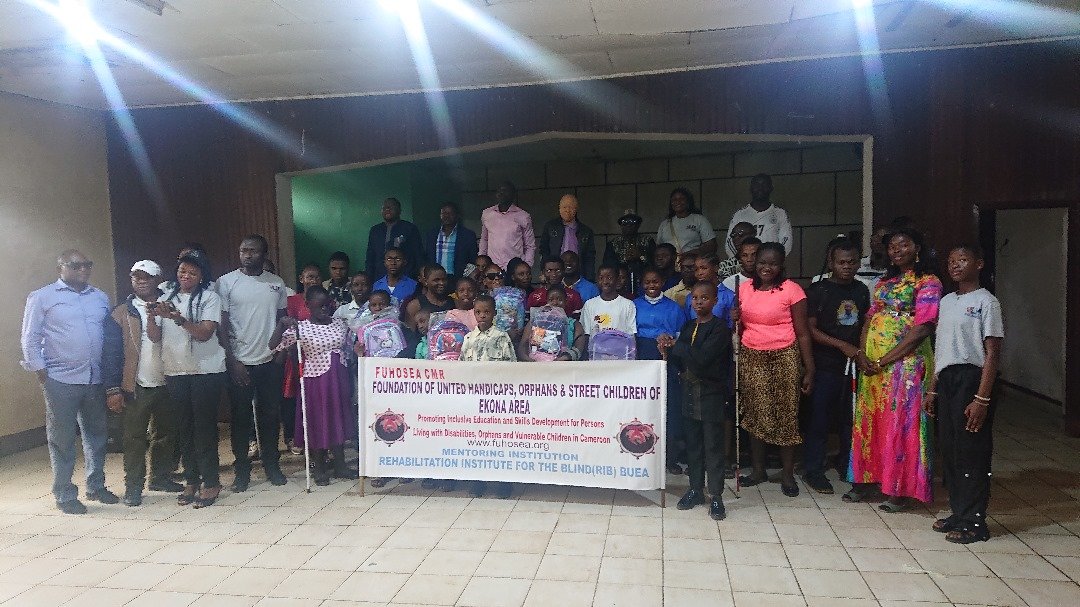“We see how many of them are wasting at home, all this potential being lost—and we cannot have peace until they are empowered.”
By Princeley Njukang, Cameroon
More than 100 socially vulnerable children, including those with disabilities, orphans, and internally displaced persons (IDPs), have received essential back-to-school support from the Foundation United for Handicaps, Orphans and Street-children of Ekona Area (FUHOSEA).
This was during the organization’s 2025/2026 back-to-school event, held at the Hall of the Borstal Institute, Buea, on November 1.
According to the organizers, the event is one in a series designed to accompany its beneficiaries throughout the academic year.
“We have been supporting them, and this year they can count on us,” Bah Gallus Bah, Executive Director of FUHOSEA, said. He emphasized that organizations like FUHOSEA must keep working to ensure access to inclusive, quality education, especially for children with disabilities.
In Cameroon, only one in ten children with disabilities has access to education, according to the CBC Health Services. In 2019, Human Rights Watch reported that at least 4000 children with disabilities in Anglophone Cameroon had been forced out of school due to the Anglophone Conflict, and were in urgent need of support to return to the classroom. FUHOSEA has consistently sought to close this gap through its educational initiatives.
“Working with them is not easy,” Bah said. “The number of beneficiaries keeps increasing, but the resources are dwindling.”
Since the closure of USAID, several organizations have come under serious funding constraints, even as the need for humanitarian assistance continues to rise. In 2023 and 2024, FUHOSEA had more than 103 pupils and students on its academic program. While some organizations have been forced to reduce their number of beneficiaries to stay afloat, Bah said it is impossible for FUHOSEA to do so.

“We see how many of them are wasting at home, all this potential being lost—and we cannot have peace until they are empowered,” he said.
Celebrating Success and Resilience
The organization used the occasion to showcase some of its success stories, which, according to Bah, inspire them to keep “doing this work.”
Meh Becajum, who is visually impaired, spoke about how, thanks to FUHOSEA, he has been able to complete a Bachelor’s degree in Public Administration and is currently in the final year of his professional training at the National School of Local Administration (NASLA).
“I’m really, really grateful. The Braille papers, the research allowance—it has helped me a lot,” he said.
At least three beneficiaries of the organization will be graduating from the University of Buea in December, with first-class and second-class upper honors, respectively. Others who passed various public exams were assured continued support.
However, some beneficiaries decried what they described as poor treatment from some schools and examination boards, urging FUHOSEA to intervene.
“The Office du BAC doesn’t Braille our questions on time. You come to school and only start writing long after your sighted peers have begun, and you’re still expected to finish at the same time,” said Simon Agom, who sat for the BEPC (French equivalent of the GCE Ordinary Level). He added that without ensuring timely transcription, visually impaired students will continue to struggle unsuccessfully.
Cameroon Human Rights Commission Joins FUHOSEA
Present at the ceremony were members of the Cameroon Human Rights Commission (CHRC), to which FUHOSEA is affiliated. They lauded the organization’s efforts to promote inclusive education and the socio-economic empowerment of persons with disabilities, describing these as fundamental rights that have been left at the fringes for too long.

“It is very challenging work because even though the law on the protection and promotion of persons with disabilities guarantees free inclusive education, many people are still ignorant, and many schools still refuse to comply,” said Mr. Atabong Felico, who coordinates Civil Society activities at the South West Regional branch of the CHRC.
He equally deplored administrative laxity in processing documents that should allow pupils and students with disabilities to study without disruption.
It was the first time FUHOSEA and the CHRC were organizing an event together since FUHOSEA’s request for affiliation was accepted last August. The affiliation, which grants FUHOSEA the status of a Civil Society Organization, will enable it to directly contribute to the promotion and protection of disability rights at the national level.
/Donations and Partnerships
The highlight of the event was the donation of didactic materials and other essential items to the pupils and students. Braille papers, books, pens, styluses, and schoolbags were distributed to the beneficiaries, alongside cash envelopes ranging from 10,000 to 50,000 FCFA.

A major partner in the distribution exercise was Love in Action Global, which brought a host of items including foodstuffs and toiletries.
“We have come to share love with them,” their representative told the press. “We are acting in obedience to Christ’s command to care for the needy,” she added, pledging her organization’s continued partnership with FUHOSEA.
A Satisfied Delegate/
Speaking at the end of the ceremony, the South West Regional Delegate of Social Affairs, Mr. Fidelis Njie, said he was “deeply” satisfied with the work done by FUHOSEA.
He noted that despite the existence of multiple organizations of persons with disabilities in the region, FUHOSEA has distinguished itself as one that truly meets the needs of the people.
“They may be many, but FUHOSEA is the success story,” he said, adding, “I will continue doing everything in my power to support you.”
The Delegate urged the beneficiaries to make judicious use of what they had received, “so that others will see the need to do more.”
